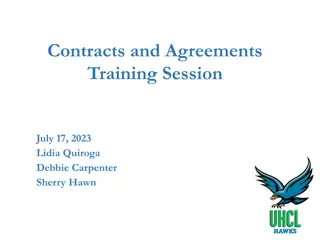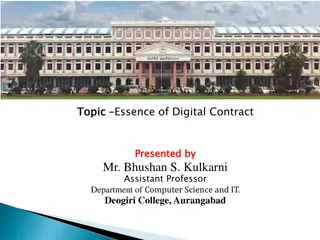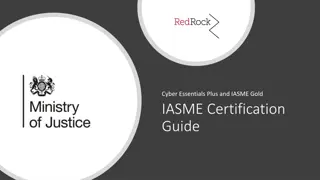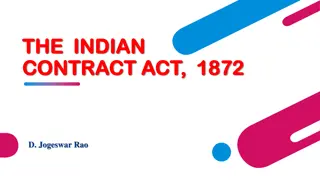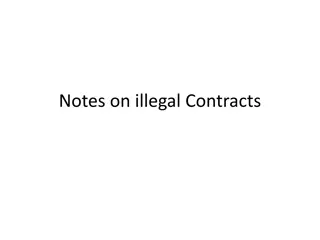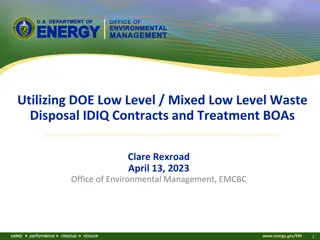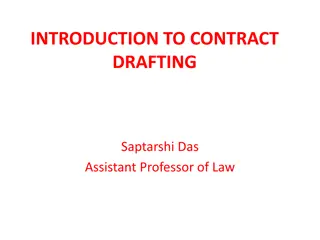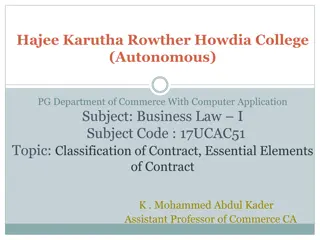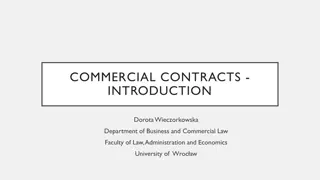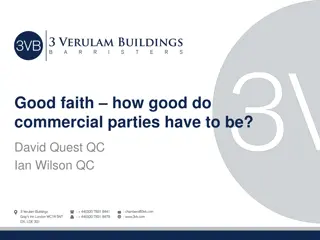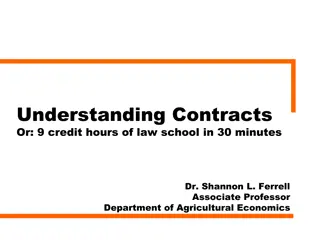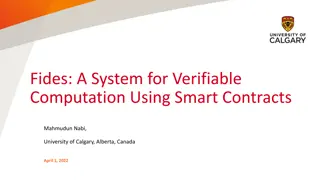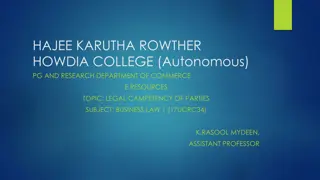Understanding Commercial Contracts: Essentials and Differences Explained
A presentation by Prashant Jain delves into the intricate world of commercial contracts, exploring the fundamental concepts, differences between LOI, MOU, and contracts, essential clauses, and the structure of a valid agreement. Learn about the significance of offer and acceptance, lawful considerations, free consent, and more in ensuring the validity of a commercial contract.
Download Presentation

Please find below an Image/Link to download the presentation.
The content on the website is provided AS IS for your information and personal use only. It may not be sold, licensed, or shared on other websites without obtaining consent from the author. Download presentation by click this link. If you encounter any issues during the download, it is possible that the publisher has removed the file from their server.
E N D
Presentation Transcript
Presentation on Commercial Contracts Prashant Jain
SCOPE 2 1Introduction 2Difference between LOI, MOU and Contract 3Structure of Commercial Contract 4Stamp Duty 5Crucial Intricacies
INTRODUCTION 3 A contract is an agreement creating and defining obligation between two or more persons by which rights are acquired by one or more to acts or forbearance on the part of others. Salmond A legally binding agreement between two or more persons by which rights are acquired by one or more to acts or forbearance on the parts of others. Sir William Anson
INTRODUCTION (CONTD) 4 The Essentials of Valid Contract: Offer and Acceptance 1 Legal Relationship 2 Lawful Consideration 3 Free Consent 4 Lawful Object 5 Writing and Registration 6 Certainty of Terms 7 Possibility of Performance 8 Not Expressly Declared Void 9
MOU, LI AND CONTRACTS 5 LI MOU CONTRACT A letter of intent is likely to encompass a number of different aspects, and it varies in length according to the level of specificity and the type of transaction. All letters of intent lay out the basics of a deal, including cost, time frame and contingencies. A memorandum of understanding is an agreement between two or more parties outlining the terms and details of an understanding, including each party's requirements and responsibilities. It is often the first stage in the formation of a formal contract and does not involve the exchange of money. A contract is a legally enforceable agreement between two or more parties with a detailed structure than LI or MOU that creates an obligation to do (or not do) a particular thing. The parties must intend to create a legally enforceable agreement, but they need not intend to create or even understand that they are entering into a contract.
STRUCTURE 6 Title Name of the Parties Recitals Body of the Agreement Dispute Resolution Termination Boiler Plates
RECITALS 7 Points to be included under recitals: Nature of business of the parties Brief background of the transaction Objective of the contract
BODY OF THE AGREEMENT ESSENTIAL CLAUSES 8 Dispute Resolution Objective Obligation of the Parties Termination Body of the Agreement Indemnification Non Compete Confidentiality Non Solicitation
OBJECTIVE 9 The objective clause generally consists of the purpose of the Agreement in detail. The clause identifies the purpose of the document and describes the transaction, the intent of the parties and any assumed facts underlying the transaction.
OBLIGATIONS OF THE PARTIES 10 The main objective of this clause is to provide a clear and detailed picture with regard to the rights and responsibilities of the parties to the contract. The covenants under this clause memorialize the promises that are being made by the parties. Examples include promises to deliver certain goods or to refrain from particular activities.
REPRESENTATION AND WARRANTIES 11 Representations and warranties identify the assumed facts underlying the agreement. These sections represent the real heart of the deal and tend to be heavily negotiated. An example would be a representation and warranty that the goods to be sold are in working order.
NON COMPETE 12 Restrain to trade Section 27 of Indian Contract Act, 1872 Exception: Sale of Goodwill Circumstances under which the clause is valid Test of reasonableness, situation of employment and fairness to both parties; protection of employer and right of employee. non-compete clauses are not to be considered as restraint of trade if they operate during the time period of employment as it was a step of the employer to protect its confidential information, hence valid Niranjan Shankar Golikari v. The Century Spinning And Mfg. Co, the apex court held: the clause is not confined only to contracts of employment, but is also applicable to all other contracts Percept D Mark (India) Pvt Ltd. v. Zaheer Khan & Anr:, the apex court has confirmed that: there should be a negative covenant to hold a non-compete clause invalid. If the non-compete clause is partial in nature and is justified to protect the interest of the company and its goodwill, then it cannot be held that the clause has a negative covenant and hence valid in nature and can be enforceable. FL Smidth Pvt. Ltd. Vs FL Smidth Pvt. Ltd, 2013, where a trainee terminated a contract after his training, the High Court of Madras held that:
NON SOLICITATION 13 restrictive covenants in contracts American Express Bank Ltd. v. Priya Puri In Wipro Ltd vs Beckman International, where the respondent was hired by petitioner as sole and exclusive distributor of its products and agreed upon a non-solicitation clause to be operative for two years after the termination of agreement. the Delhi High Court held that : a non-solicitation clause is a restrictive clause and not a negative covenant and hence, is not void
CONFIDENTIALITY 14 An employer is thus entitled to protect confidential information which amounts to a trade secret or which prevents some personal influence over customers being abused in order to entice them away In Faccenda Chicken Ltd. v. Fowler, the Court held that: A covenant that is reasonably necessary to protect an employer against the betrayal of trade secrets or confidential information is not void merely because it unavoidably protects the employer against competition. In the case of Schroeder (A) Music Publishing Co. Ltd. v. Macaulay the Court held that: restraining Escorts (respondent) from manufacturing, selling or offering for sale the Pick-N-Carry Mobile Cranes that were a substantial imitation or reproduction of the industrial drawings of the Plaintiffs, or from using in any other manner whatsoever, the technical know-how is valid and enforceable. In Escorts Const. Ltd v. Action Const, the Delhi High Court held that:
CONFIDENTIALITY (CONTD.) 15 In Burlington Home Shopping Pvt. Ltd. v. Rajnish Chibber, the Delhi High Court restrained carrying on of any business including mail order business by utilizing the list of clientele/customers included in the database of the petitioner. To determine if an information is confidential in nature or not, following are the points that the court considers: Is the information in public domain? The information must have involved some thought or effort. The owner must believe that disclosing the information would cause them damage or would give advantages to their rivals or others. In deciding whether information is confidential in nature or not, a court considers the common practice in the particular industry.
INDEMNIFICATION 16 A contract by which one party promises to save the other from loss caused to him by the conduct of the promisor himself, or by the conduct of any other person, is called a "contract of indemnity. Section 124 of the Contract Act, 1872: The promisee in a contract of indemnity, acting within the scope of his authority, is entitled to recover from the promisor damages, amount paid and/or costs. Section 125 of the Contract Act: the question of making good the loss arises only when there is proof that loss is suffered. In the case of State Bank of Saurashtra vs Ashit Shipping (2002), the Supreme Court held that: In Jet Airways (India) Limited v. Sahara Airlines State Bank of Saurashtra vs Ashit Shipping Limited and Ors (2011), the Bombay Court, keeping in mind the decision of Supreme Court in held that: an indemnity holder is entitled to sue the indemnifier even before incurring any actual damage or loss and that an indemnity is not necessarily given by repayment after payment. Indemnification does not restricts only to direct losses but also covers indirect losses. In Total Transport Corporation v. Arcadia Petroleum Limited, (1998), the Court held that:
TERMINATION 17 Should incorporate number of obligations that the parties must follow on termination. Important to draft a detailed and thorough termination clause. Should have an appropriate process to terminate the agreement.
TERMINATION (CONTD.) 18 Rajasthan Breweries Ltd. vs. The Stroh Brewery Company (MANU/DE/0860/2000) Two Agreements executed between the parties. Exclusive License was given to Party A for producing Stroh Beer in India for 9 years which may renewed for successive period of 3 years each time. Party A set up a computerized brewery at a cost of more than 20 million dollar and had also imported a number of costly equipments. Party B terminated the contracts on the grounds of quality and standards, inconsistent production resulting in frequent product shortages in the market, late and insufficient payment of dues. Party A contended - there is no clause in the agreement, which permits the respondent to terminate the agreements by giving a notice of a few days.
TERMINATION (CONTD.) 19 The Court held that Even in the absence of specific clause authorizing and enabling either party to terminate the agreement in the event of happening of the events specified therein, from the very nature of the agreement, which is private commercial transaction, the same could be terminated even without assigning any reason by serving a reasonable notice.
DISPUTE RESOLUTION 20 Clear and unambiguous dispute resolution clause is very important. Should be drafted, specific to transaction at hand. This clause shall contain the following; Dispute resolution mechanism such as conciliation or arbitration; Governing law; and Jurisdiction. A valid arbitration clause is separable from the main contract, and the invalidity of the main contract does not necessarily entail the invalidity of the arbitration agreement. In SMS Tea Estates Pvt. Ltd. Vs. Chandmari Tea Company Pvt. Ltd. (MANU/SC/0836/2011)
DISPUTE RESOLUTION (CONTD.) 21 In Ashapura Mine-Chem Ltd ("Appellant") vs. Gujarat Mineral Development Corporation (2015 (5) SCALE 379), the parties entered into a MOU for setting up an alumina plant in Gujarat by way of a Joint Venture. The MOU provided for an arbitration clause in the event of parties' failure to settle disputes amicably. Subsequent to the signing of the MOU, the Respondent decided to approve the MOU subject to certain modifications. After considerable exchange of correspondence, the Respondent sought amendments to the original MOU due to major change in State policy. However, eventually the Respondent cancelled the MOU on the pretext that Appellant had failed to comply with the terms and conditions contained therein. Failed to resolve their disputes amicably and no consensus could be reached on appointment of Arbitrator between the parties. The Appellant filed an application under Section 11 of the Indian Arbitration & Conciliation Act, 1996 (Act) for appointment of Sole Arbitrator.
DISPUTE RESOLUTION (CONTD.) 22 The Gujarat High Court dismissed the application for appointment of Arbitrator on the ground that the MOU never resulted in a complete contract, and accordingly held that no enforcement could be sought for the same. The Gujarat HC held that the MOU was "stillborn" as it did not fructify into a joint venture. The Supreme Court found that irrespective of whether the MOU fructified into a full-fledged agreement, the parties had agreed to subject all disputes, arising out of and in connection to the MOU, to arbitration. Such an agreement would constitute a separate and independent agreement in itself.
BOILER PLATES 23 Entire Agreement Severability Notice Waiver Assignment Force Majeure Counterparts.
JOINT VENTURE AGREEMENT 24 A contractual joint venture is where two or more parties agree to collaborate on a project, but do not set up a separate legal entity or pool the profits and losses. Each party keeps their accounting records separate and there are no registration requirements. Some important clauses to be incorporated under JV Agreement are: Formation and objective of JV entity 1 Shareholding Pattern; 2 Business Plan; 3 Financial Arrangements; 4 Transferability of Shares; 5 Right of First Refusal; 6 Tag/Drag Along Rights; and 7 Governance and Board Management. 8
FRANCHISE AGREEMENT 25 Franchise means license from the owner of a trademark or trade name permitting another to sell a product or service under that name or mark. There are two models of franchise agreement and they are: Company owned franchise operated; and 1 Franchise owned company operated. 2
CONT.. 26 Legal Issues: Intellectual Property; 1 Consumer Protection and Liability; 2 Competition Law; 3 Insurance; 4 Tortious Issues; 5 Agency; 6 Tax; 7 Labour; and 8 Corporate and Securities 9
CONT 27 The important clauses to be incorporated under a franchise agreement: Appointment and Territory of Franchisee; 1 Rights and obligations of the parties; 2 Investments and financial arrangements; 3 Operational expenses and control; 4 Audit; 5 Intellectual Property; and 6 Term and Termination. 7
TECHNICAL COLLABORATION AGREEMENT 28 Technical collaboration is a contract where one party agrees to provide technical know-how or any technical assistance to the other party. Some important clauses to be incorporated are: Grant of license; Obligations and rights of the parties; Financial Arrangements; Use of Intellectual property; and Intellectual property rights.
STAMP DUTY 29 Without adequate stamping a document cannot be given legal effect to and therefore does not have any evidential value. In case if there is any dispute or any legal case in court than the question of your answer will be in a hand of Magistrate that whether they will consider it valid or not. Magistrate can make it valid while applying Stamp Duty on your Agreement. In Om Prakash vs. Laxminarayan & Ors. (Civil Appeal No. 9032 of 2013), Plaintiffs filed a suit for specific performance of contract, possession and permanent injunction in respect of un-irrigated land.
STAMP DUTY (CONTD.) 30 properties in question were delivered to them on payment of the part consideration money in pursuance of the agreement to sell. Plaintiff no agreement to sell was ever executed and possession given. Defendant the agreement to sell was sought to be proved and admitted in evidence by the plaintiff. During Trial Questioned the admissibility of the agreement on the ground of not duly stamped as per Article 23 of Stamp Act. Defendant The trial court held the agreement to sell to be inadmissible in evidence as it has not been sufficiently stamped.
STAMP DUTY (CONTD.) 31 The Supreme Court held an authority to receive evidence shall not admit any instrument unless it is duly stamped. An instrument not duly stamped shall be admitted in evidence on payment of the duty with which the same is chargeable or in the case of an instrument insufficiently stamped, of the amount required to make up such duty together with penalty.


